
Legal Aid Acts Fast to Defeat Eviction Action, Tenant Overjoyed
05 December 2014 Blog, East River of the River Profiles | Tags: housing
By Chinh Le & Mike Mazella Ms. Moore (name changed to maintain client confidentiality) came to Legal Aid’s office in Anacostia (the one with the Big Chair in front) for help with her eviction case. Her landlord had sued to evict her for nonpayment of rent. The Legal Aid attorney staffing the Big Chair office met with Ms. Moore that day and was able to refer her to a Legal Aid attorney at our courthouse office for further assistance with her housing issue. When Ms. Moore came to the courthouse office, her case was scheduled for a bench trial that same day. Her situation looked bleak. However, Ms. Moore credibly disputed the rent amount that the landlord was charging her. Indeed, the Legal Aid lawyer was able to determine that the landlord had unlawfully increased her rent by 30% during the initial lease term. A Legal Aid lawyer helped Ms. Moore stay in her home and avoid eviction. The attorney negotiated an agreement that reduced the balance by almost 90%, reduced Ms. Moore’s monthly rent to the correct amount going forward, and required the landlord to complete all outstanding repairs to the apartment. Ms. Moore and her attorney were able to navigate the situation together, allowing Ms. Moore to live comfortably in her home.
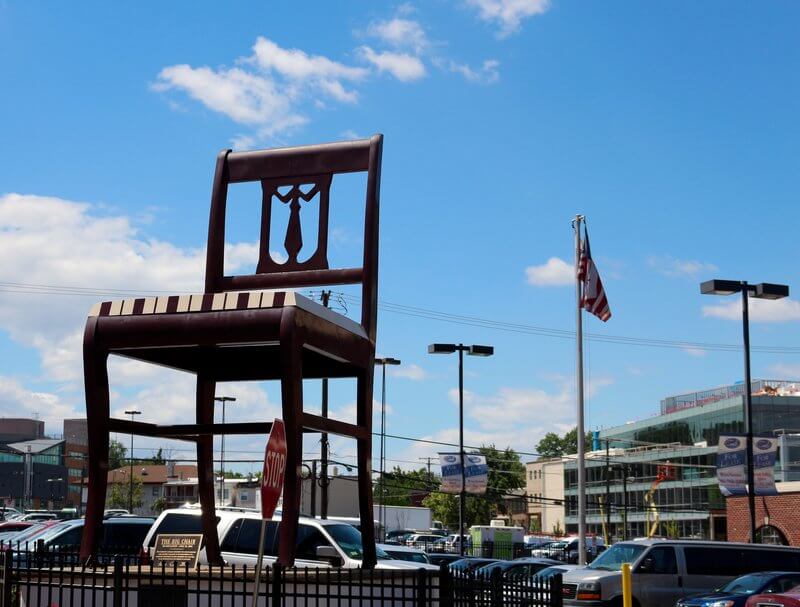
Legal Aid Attorney Helps Stroke Victim Retain Residence
04 December 2014 Blog, East River of the River Profiles | Tags: housing
By Chinh Le & Mike Mazella Mr. Brown (name changed to maintain client confidentiality) and his wife came to the Big Chair office in Southeast D.C., because they had been sued as squatters by their landlord. A few weeks prior, they had received a favorable administrative decision resolving a tenant petition they filed against their landlord to contest an illegal rent increase. Rather than accept or appeal the administrative order, the landlord ignored it and sued Mr. Brown as a squatter in landlord-tenant court. The case was based on the landlord’s claim that Mr. Brown, who had rented his current unit since 1994, was not a tenant of that unit, and was only permitted to reside in a studio unit that he had previously rented from 1986–1994. Legal Aid filed a motion to dismiss the landlord-tenant case. The pro se landlord decided that she needed to hire an attorney, which she did and shortly thereafter voluntarily dismissed the case before the hearing. Mr. Brown had been struggling with complications from a stroke and has great difficulty communicating and getting around. Throughout the hearings, Mr. Brown’s attorney met him and his wife at the Big Chair office and at their home, so that Mr. Brown could avoid having to travel and cut down his transportation time to the court. What began as a mentally and potentially physically stressful problem for Mr. Brown and his wife ended happily as a result of Legal Aid’s help through our presence at the Big Chair.
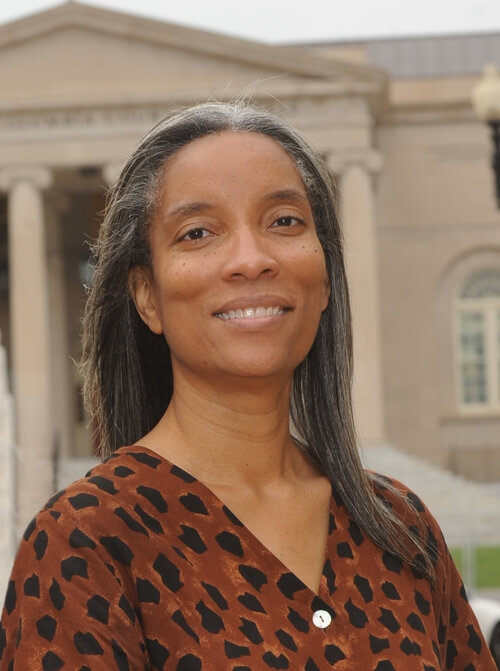
2014 Presidents’ Award for Public Service: Avis Buchanan
03 December 2014 Blog | Tags: awards, presidents award for public service
For the last ten years, Avis E. Buchanan has been the director of the Public Defender Service for the District of Columbia(PDS), which provides defense, and related legal and non-legal services, to indigent adults and children charged with crimes and delinquent acts in the local DC courts. PDS is widely regarded as one of the best public defender offices in the country, local or federal; Avis is the longest-serving director in PDS history. As director of PDS, Avis oversees an extensive range of cutting-edge legal and non-legal services aimed at providing the best possible representation to criminal defendants. PDS has a staff of 220, roughly half of whom are lawyers. PDS has seven legal units and, uncommonly, pulls from those to create practice groups that focus, for example, on forensics and mental health, two chief aspects of trial and sentence-mitigation work. Specialists not only assist in individual cases but push for reforms of local and federal policies and legislation. They also run training programs for lawyers, social workers, investigators, and others working on the front lines of DC justice. Indeed, PDS was set up as a model public defender organization, Avis says. “We give people a fighting chance, just as rich people have… We are helping people at a very crucial time in their lives. We are dealing with people facing scornful, judgmental attitudes.” PDS attorneys force the system to see people as human beings – not just criminals, or bodies moving through the system. Avis has worked to expand access to justice throughout her career, in both civil and criminal cases. After graduating from law school and clerking for a federal appellate judge, Avis joined PDS as a staff attorney in 1982. She represented criminal defendants for six and a half years, during the height of the crack epidemic in D.C. For the next 13 years, Avis served as a staff attorney at the Equal Employment Opportunity Project, and then director of litigation at Washington Lawyers’ Committee for Civil Rights and Urban Affairs. There, Avis litigated individual and class action civil rights cases across the country. After over a decade of litigating civil-rights cases, Avis returned to PDS in 2002, as deputy director, and then became its director in 2004. Avis, who grew up in Washington, DC and Prince George’s County, says that the struggle for civil rights has been a “running theme of my existence” and results directly from the influence of her father. Her parents’ values and her faith led her into public interest law and continue to guide her work. “The idea of helping people and doing for others is what I was taught at home and taught at church,” she said. And Avis continues to be active in her community: she sits on her church’s board of trustees, her former elementary school’s board, and on the board that runs the local Adventist Health Care system. She also sits on the board of the National Legal Aid and Defender Association and on our own Honorary Board. Finally, Avis is a mentor to young people in a variety of settings. She has served as a mentor through the public interest program at Harvard Law School, and has volunteered to be a mentor at Georgetown Law. She also reaches out to younger people at church, and takes time to help young people who friends or colleagues send to her for advice. “I have them come down to the office, introduce them to attorneys and take them to do court-watching,” she says. “It demystifies the job, and shows them it is within their reach.” We’re not the first to notice Avis’s accomplishments. She has received the Wiley A. Branton Award from the Washington Lawyers’ Committee for Civil Rights and Urban Affairs and the Edwin D. Wolf Award from the Lawyers’ Committee for Civil Rights Under Law. We’re pleased to join these organizations in honoring Avis’s many contributions to both civil and criminal justice.
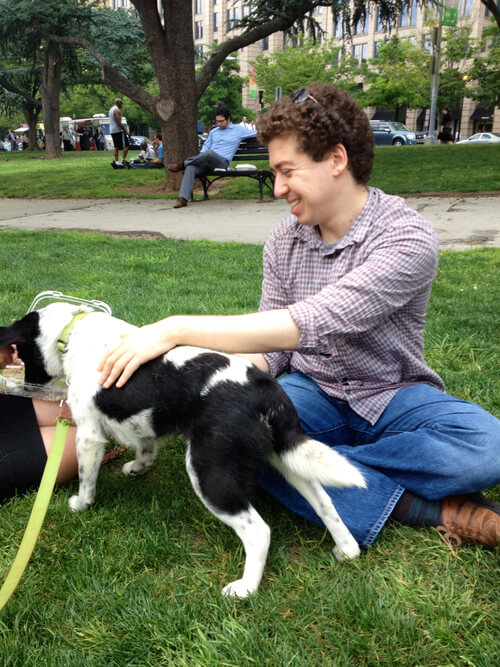
2014 Above & Beyond Award: Gregory Lipper (Americans United for Separation of Church and State)
26 November 2014 Blog | Tags: 2015 awards, above & beyond award, awards
Greg Lipper was introduced to Washington Council of Lawyers in 2011 by Taryn Wilgus Null, our then-President and at the time a colleague of Greg’s at Americans United for Separation of Church and State, where Greg is a First Amendment litigator. Taryn invited Greg to attend one of our programs with her, and introduced him to some of our other members. Fast forward: Greg joined our Board of Directors in 2012, instantly became the Chair of our brand-new, but sorely needed, Communications Committee, and revolutionized our outreach, communications, and impact. Greg’s tireless work ethic, quick wit, and razor sharp editor’s pen have transformed the way we reach DC’s public interest community. Some attorneys have even commented that they ENJOY reading our emails! Under Greg’s leadership, we started an active, lively Twitter account; before Greg, we didn’t even know what Twitter was. Greg and his team on the Communications Committee have launched us into photos, graphics, Facebook, Storify, Flickr, Tumblr, and an overall “bettr” way of working towards our mission of promoting pro bono service and the public interest practice of law. We asked our board members what they liked best about Greg, and here is what they had to say: Greg gives 110% to everything he does. Greg is always pushing the envelope and successfully encouraging the Washington Council of Lawyers to reach new heights. His energy and enthusiasm know no bounds. Greg possesses an uncommon blend of humor, sincerity, and intellect. Greg brings new ideas and ways to use technology to advance our core mission with such excitement for our work. Greg has pushed and pulled us into the 21st century in terms of our use of social media. His energy and enthusiasm are boundless. Plus, he makes me laugh—a lot. Greg constantly challenges everyone around him to be more thoughtful, rigorous and excellent. He changes the very nature of any conversation and dialogue with his presence. The council is a far more energetic and current organization because he is on its Board. Greg has tenacity! Greg has played a critical role in the marketing and inter-connectedness of the Council with its members and the public. Kudos to Greg! Greg’s energy, creativity and technical expertise makes him an indispensable member of the Council. I admire his willingness to advocate for a position in light of opposition—his willingness to challenge the board makes us a stronger organization. Greg gets things done as soon as the idea is out of someone’s mouth! I’m grateful for his very helpful combination of dedication, energy and efficiency! There are too many good things about Greg to be able to mention them all here – I will email with a bit more reflection to pare it down! I will Tweet my comments about Greg. We are grateful for all of Greg’s work, and we are delighted to recognize him with our Above and Beyond Award.
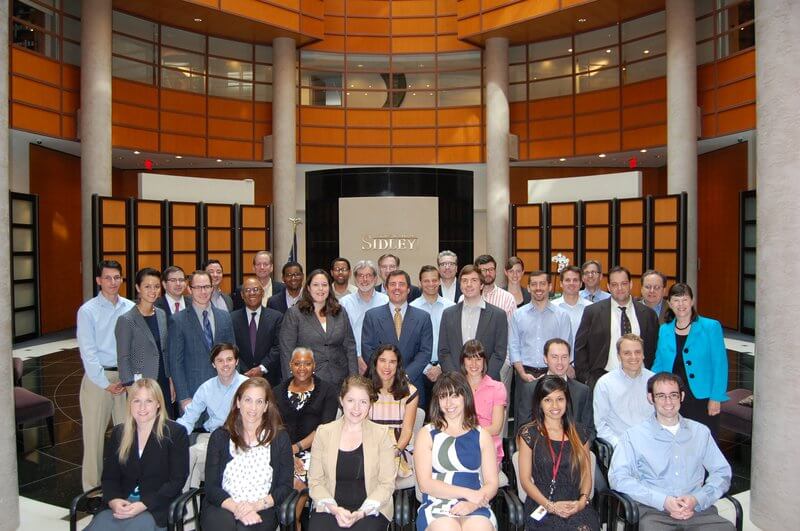
2014 Law Firm Award: Sidley Austin
25 November 2014 Blog | Tags: awards, law firm award, pro bono
Our 2014 Law Firm Award goes to our longtime friends at Sidley Austin LLP. Sidley is a global law firm with more than 1,800 lawyers in 18 offices around the world, including in Washington, DC. While often hired to handle complex transactions and “bet the company” litigation, Sidley also recognizes its profound responsibility to use its lawyers’ skills and experience to provide services to individuals and organizations that otherwise would be unable to afford legal representation. “Pro bono is something our firm’s management cares deeply about and takes personally,” say Jeffrey Green, partner and firm-wide chair of Sidley’s Pro Bono Committee, and Becky Troth, pro bono counsel for Sidley’s Washington, D.C. office. As one indication of the firm’s commitment to pro bono work, Sidley’s lawyers and staff devote more than 100,000 hours to pro bono projects annually. Sidley’s Committee on Pro Bono and Public Interest Law was instrumental in implementing four significant firm-wide initiatives in the last ten years: (1) the Capital Litigation Project, handling death penalty appeals; (2) the Political Asylum and Immigrants’ Rights Project, representing clients in political asylum and other immigration matters; (3) the Veterans Benefits Project, representing veterans in benefits appeals; and (4) the Africa-Asia Agricultural Enterprise Program, serving the world’s poorest farmers and their communities. In addition to these firm-wide projects, Sidley has served pro bono clients in virtually every area of the law, from individual actions to recover disability benefits and child support to national cases affecting voting rights and marriage equality. Another important component of Sidley’s pro bono work is its fellowship program, which allows associates to work at nonprofit organizations before they join the firm. Over the last twelve years, more than 60 incoming Sidley associates have served as DC Bar Pro Bono Fellows at local legal services organizations. Since March 2012, Sidley also has sponsored a loaned associate program with the Legal Aid Society of DC, through which a Sidley associate spends four months working full-time with Legal Aid’s Barbara McDowell Appellate Advocacy Project. Over the last year, Sidley has received significant recognition for its pro bono program. Among many other distinctions, it was included among Law360’s Pro Bono Firms of 2014; received the 2014 Exceptional Service Award from the ABA Death Penalty Representation Project; and won the Pro Bono Counsel Award from the National Law Center on Homelessness & Poverty. Finally, Sidley has provided extensive support directly to Washington Council of Lawyers and our projects. Betsy Howe, a Partner in Sidley’s DC office and chair of Sidley’s Pro Bono Committee in Washington, served as our treasurer in 2012–2013 and our president in 2013–2014. Becky Troth has been an important part of the DC Pro Bono Weekworking group for many years; together, with Mayer Brown’s Marcia Maack, Becky organized the Virtual Pro Bono Fair, a lasting resource for the pro bono community. We are also grateful for the firm’s generosity with use of their space and sponsorships of our events. It is due to the strong support of law firms like Sidley Austin that we have been able to grow, thrive, and better promote pro bono service and public interest law. We are grateful to Sidley Austin and pleased to honor the firm with our 2014 Law Firm Award. You can learn more about Sidley and our other award winners at our 2014 Awards Ceremony.
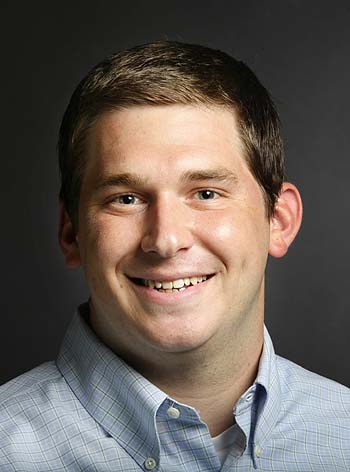
2014 Government Pro Bono Award: John Bowers (DOJ Civil Division)
20 November 2014 Blog | Tags: 2014 pro bono awards, awards, government pro bono awards
Our 2014 Government Pro Bono Award goes to John J. (Joey) Bowers, a trial attorney at the Department of Justice Civil Division. Joey has become a role model for the public interest community in a surprisingly short time. Joey joined the Civil Division’s Environmental Tort Litigation section after he finished clerking in 2011. Since then, he has taken on three major pro bono cases. In 2011, Joey took on a case that many other lawyers thought was too challenging; he helped a mother from Massachusetts maintain her custody rights in a trial that involved nine witnesses. In 2012, while still working on the custody case, he represented a client wrongly accused of causing a car accident. And he took on another case that same year, which ended after Joey spent 11 hours negotiating a settlement on the Sunday before trial. Joey has done plenty of other pro bono and volunteer work as well. He has helped clients draft wills and powers of attorney through the DC Bar/Bread for the City will clinic. He has volunteered at the DC Bar Advice and Referral Clinic. He coaches the Woodrow Wilson High School mock trial team and has led them to compete at a citywide program at the DC Superior Court. He is Co-Director of the Federal Bar Association’s Moot Court Program. And he is Co-Chair of the Summer Law Clerk Program for the Federal Bar Association’s Younger Lawyers Division. Joey has helped a huge number of people in a very short time despite an extremely busy schedule. He is a true public servant, and we are pleased to honor him with our 2014 Government Pro Bono Award.
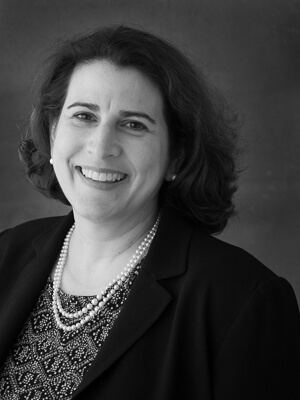
2014 Legal Services Award: Jodi Feldman (Legal Aid DC)
14 November 2014 Blog | Tags: awards, legal services award
Our inaugural Legal Services Award goes to Jodi Feldman, Supervising Attorney for Pro Bono and Training Programs at the Legal Aid Society of the District of Columbia. Jodi is known throughout our legal community for her work ethic and commitment to pro bono service, but she also has been called the quintessential “unsung hero.” Most of her work involves building infrastructure behind the scenes – creating and improving programs that enable pro bono attorneys to provide high-quality legal help to thousands of people in need. After graduating from Georgetown Law, Jodi practiced at Wiley Rein before becoming a Staff Attorney and Pro Bono Coordinator of the Legal Services Program at Whitman-Walker Health. Jodi then joined Legal Aid in 2004, and jumpstarted its pro bono program. Legal Aid has increased the number of cases it places with volunteers every year for the past four years. Last year, attorneys contributed a staggering $16.5 million worth of attorney time for Legal Aid. Jodi’s work has increased not only the quantity of Legal Aid’s referrals, but also the quality of the resulting representation. She carefully matches pro bono lawyers with appropriate cases, makes sure that those lawyers get a Legal Aid mentor while working on their cases, and follows each case’s progress to its finish. She meets with various law firms throughout Washington, DC and coordinates firm-specific trainings. Jodi’s leadership also inspired unemployment-insurance referral relationships with both Arnold & Porter and McKenna Long & Aldridge and led to the establishment and maintenance of Skadden’s domestic violence Impact Project. On top of all of that, Jodi has given back to our legal community. She manages Legal Aid’s student intern program. She has been an active member of Washington Council of Lawyers and served on our board for several years. In fact, one board member notes that Jodi’s enthusiasm inspired her to become a member and participate in our events. Jodi is dedicated, energetic, and enthusiastic – and she gets results. We couldn’t be more pleased to honor her with our Legal Services Award. You can learn more about Jodi and our other award winners at our 2014 Awards Ceremony.
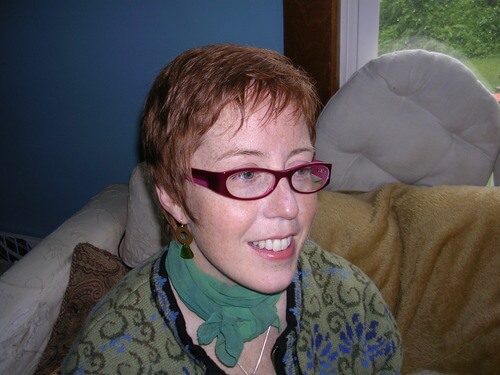
Meet Lydia C. Watts – Our New Associate Director
07 November 2014 Blog | Tags: staff
Over the past few years, we’ve expanded our programs, events, and activities. In fact, we’ve been expanding so much that we needed more staff to keep all of the trains running. So we’re pleased to announce that Lydia C. Watts will be joining us as our Associate Director. A summa cum laude graduate of American University’s Washington College of Law, Lydia has an impressive and diverse array of experience and a deep commitment to public interest law. She is Deputy Director of the DC Access to Justice Commission, which works to address barriers to the justice systems facing low- and moderate-income people in Washington, DC. Since September 2005, Lydia has also been a Principal of Greater Good Consulting, which specializes in nonprofit organizational development. Lydia was previously Executive Director and Co-Founder of Women Empowered Against Violence, Director of Quality and Program Enhancement of the National Legal Aid and Defender Association, Executive Director of the Victim Rights Law Center in Boston, and Executive Director of the Massachusetts Alliance on Teen Pregnancy. She is the founding board chair of the Network for Victim Recovery of DC, a holistic service provider for victims of crimes in Washington, DC. And she serves on the Board of Directors of Mentoring Today. As for her new position, Lydia is as excited as we are: “I am so honored to join the staff of the Washington Council of Lawyers. As a long-time public interest attorney in DC, I am very familiar with all of its amazing programs, events, and opportunities to keep our community informed and united. I am eager to be a part of expanding those offerings and getting to know our members even better.” A warm welcome to Lydia, and we hope you all get to meet her soon!
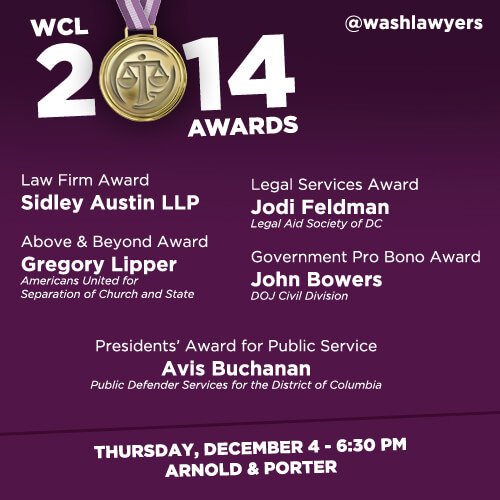
Our 2014 Award Winners
28 October 2014 Blog | Tags: awards
We’re pleased to announce the winners of our 2014 Awards: Legal Services Award Jodi Feldman Legal Aid Society of the District of Columbia Government Pro Bono Award John Bowers US Department of Justice, Civil Division Law Firm Award Sidley Austin LLP Above & Beyond Award Gregory Lipper Americans United for Separation of Church and State Presidents’ Award for Public Service Avis Buchanan Public Defender Service for the District of Columbia Please congratulate these fine folks and organizations, and join us for the Awards Ceremony on December 4, at 6:30 pm.






